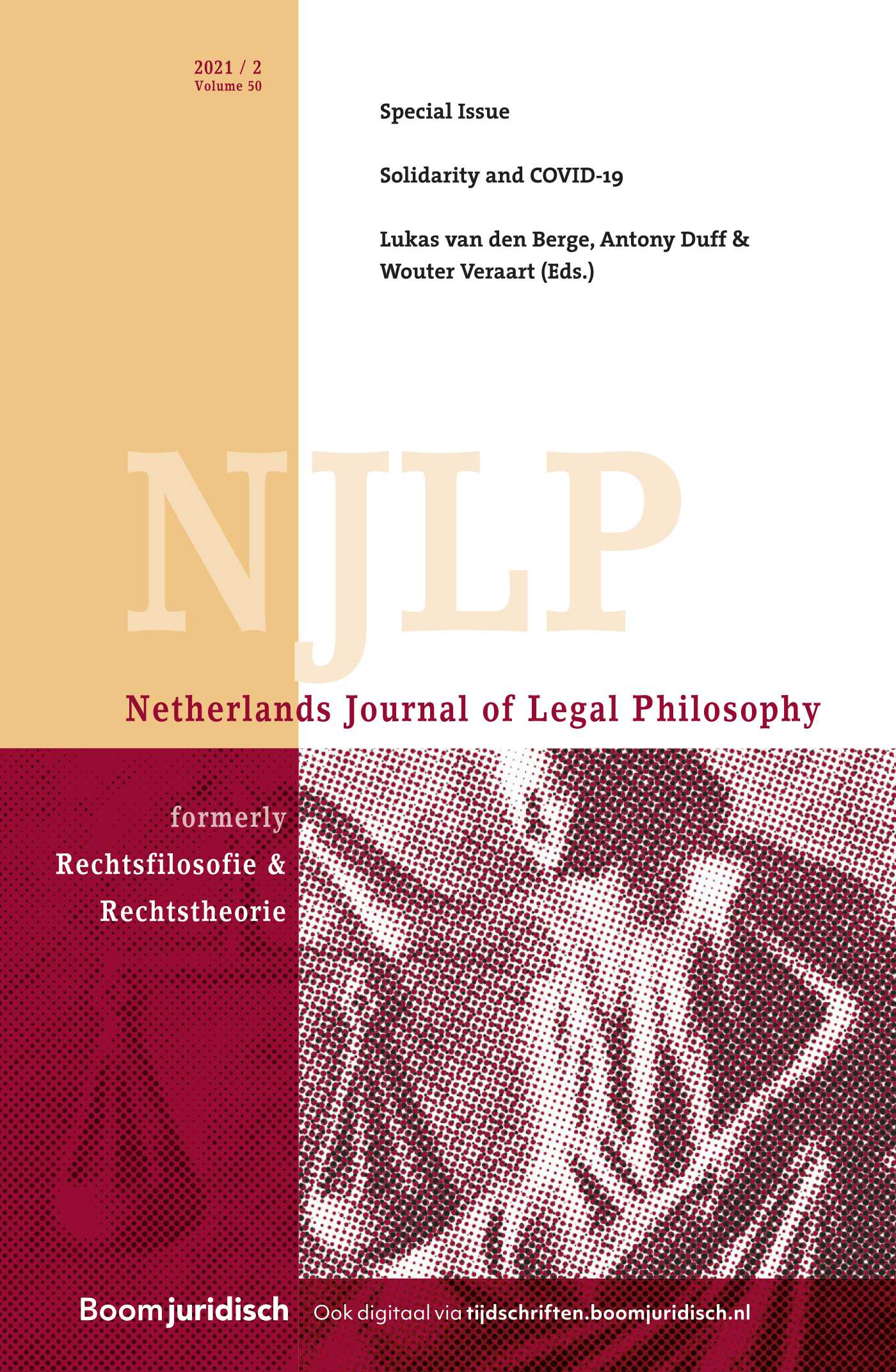|
“Het waren mijn genen, edelachtbare, niet ik” kopte NRC Handelsblad van donderdag 5 november 2009.1xFolkert Jensma, “Het waren mijn genen, edelachtbare, niet ik”, NRC Handelsblad, 5 november 2009. Het artikel bericht over een Italiaanse rechtszaak waarin in hoger beroep de straf die aan een moordenaar werd opgelegd, werd verlaagd van twaalf naar negen jaar. De raadsheer nam deze beslissing, aldus de verslaggever, nadat twee neurowetenschappers van de universiteiten van Pisa en Padua op een hersenscan onregelmatigheden hadden aangetoond en bovendien afwijkingen waren gevonden in het MAOA-gen, dat ook wel bekendstaat als het ‘agressiegen’. Noten
|


Netherlands Journal of Legal Philosophy
About this journalSubscribe to the email alerts for this journal here to receive notifications when a new issue is at your disposal.
| Editorial |
|
| Authors | Anne Ruth Mackor |
| AbstractAuthor's information |
| Article |
|
| Keywords | Scholten, Dooyeweerd, legal principles, legal reasoning, religion |
| Authors | Bas Hengstmengel |
| AbstractAuthor's information |
|
The legal scholars Paul Scholten (1875-1946) and Herman Dooyeweerd (1894-1977) had much in common. The most significant agreement is their emphasis on the influence of a (religious) worldview on legal scholarship and practice. Unfortunately, they never met to discuss the similarities and differences of their jurisprudential ideas. In this article I try to reconstruct this conversation which never took place. Scholten’s legal thought is specifically oriented to the practice and difficulties of judging. Dooyeweerd above all was a philosopher whose specific philosophy of the modal aspects of reality is the basis for his thinking about the law. Both scholars emphasized the importance of legal principles. They also identified several fundamental legal categories and concepts. However, their methodology is different. The way religion and morality influence their legal thought is also different. A discussion of the contemporary relevance of their work completes the paper. |
| Article |
|
| Keywords | psychology of law, criminal law, miscarriages of justice, hypothetical reasoning |
| Authors | Klaas Rozemond |
| AbstractAuthor's information |
|
In their book De slapende rechter (The sleeping judge) Dutch legal psychologists W.A. Wagenaar, H. Israëls and P.J. van Koppen claim that Dutch judges wrongfully convict suspects in certain cases because these judges generally fail to understand the way hypothetical reasoning works in relation to empirical evidence. This article argues that Wagenaar, Israëls and Van Koppen are basically right in their claim that reasoning on evidence in criminal cases should have the form of hypothetical reasoning. However, they fail to apply this form of reasoning to their own analysis of Dutch criminal cases and the causes of wrongful convictions. Therefore, their conclusion that a form of revision of convictions outside of the criminal law system should be introduced does not meet their own methodological standards. |
| Article |
|
| Keywords | Legitimation durch Verfahren, criminal law, expert-witnesses, truth, reliability of evidence |
| Authors | Anne Ruth Mackor |
| AbstractAuthor's information |
|
Huls has argued that the idea that judges are truth-finders is misleading. In the first part of the paper I put his claim to the test. Against Huls I argue that the aim of procedures in criminal lawsuits is not only to guarantee binding decisions but also to help to find the truth. In the second part of the paper I investigate the role expert-witnesses play in truth-finding. Cleiren and Loth have argued that experts fail to understand the differences between legal and scientific ways of truth-finding. It turns out that Cleiren does not offer an argument for her claim and that Loth’s claim fails too, since it confuses coherence as truth and coherence as epistemic justification. I conclude that legal scholars, rather than experts, fail to understand the nature of legal and scientific truth-finding. |
| Miscellaneous |
|
| Keywords | Schauer, rule priority, legal principles, legal positivism, generality |
| Authors | Bo Zhao |
| AbstractAuthor's information |
|
Professor Schauer covers many topics in this interview. On a general note, the interview covers themes pertaining to his experience in engaging with legal philosophy as a trained lawyer; his views on the present and the future of legal philosophy and how we shall cope with its development; his new book Thinking like a Lawyer; the role of legal philosophers in law and society; and some sincere suggestions to young legal philosophers. It also covers more specific topics, including discussions about his insistence on rule priority; differences between legal principles and rules; his opinion of legal positivism; and the pros and cons of analytical tools like spectrum, continuum and generality. |
| Book Review |
|
| Authors | Peter van Schilfgaarde |
| AbstractAuthor's information |
|
Peter van Schilfgaarde, book review of Amartya Sen, The Idea of Justice |
| Book Review |
|
| Authors | Arend Soeteman |
| AbstractAuthor's information |
|
Arend Soeteman, book review of Jan Smits, Omstreden rechtswetenschap, Over aard, methode en organisatie van de juridische discipline |
| Book Review |
|
| Authors | Machiel Karskens |
| AbstractAuthor's information |
|
Machiel Karskens, book review of Hans Lindahl (red.), A Right to Inclusion and Exclusion. Normative Fault Lines of the EU’s Area of Freedom, Security and Justice |
| Book Review |
|
| Authors | Thom Holterman |
| AbstractAuthor's information |
|
Thom Holterman, book review of Jacques Langlois, Misère du droit. |

 Issue 3
Issue 3